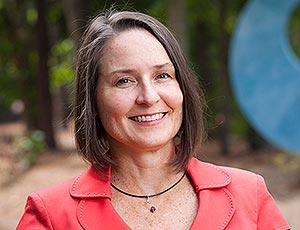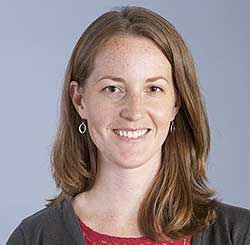Duke Law team contributes to initiative aimed at improving farm bill
The omnibus legislation known as the farm bill touches on virtually every aspect of the U.S. food and agriculture systems. With the current version — the Agriculture Act of 2014 — set to expire next year, members of the Duke Law community have joined an initiative aimed at improving its replacement and reshaping federal food and agriculture policy more broadly.
 Prof. Michelle Nowlin
Prof. Michelle Nowlin
Clinical Professor Michelle Nowlin JD/MA ’92, the supervising attorney in the Environmental Law and Policy Clinic, former clinic Stanback Fellow Emily Spiegel ’14, and Zach Lankford ’18 contributed research and recommendations pertaining to equitable and economically sustainable farming to the Farm Bill Law Enterprise (FBLE), a consortium of leading food, agriculture, and environmental programs at seven law schools. Collaborating with colleagues from the law schools at Yale and Harvard, where FBLE is headquartered, the Duke Law team focused on issues surrounding entry and success in agriculture for minority, women, and beginning farmers and ranchers, investigating and analyzing such challenges as land transfer and access to capital and credit faced by these groups.
Several students in Nowlin’s Food, Agriculture, and the Environment course are now doing additional research into transparency and accountability in the allocation of resources in programs established and funded through the farm bill. These students will travel to California in November to discuss their research at the Food Law Student Leadership Summit at UCLA. Their findings will be incorporated into the comprehensive report and policy proposals FBLE plans to release later this year.
The FBLE researchers addressing sustainability and diversity in agriculture used data collected by the U.S. Department of Agriculture (USDA) as a starting point. Although 38 percent of the population identifies as a racial minority, 98 percent of privately owned farmland in the U.S. is owned by white farmers, who also receive more than 97 percent of government farm payments. Women account for less than 14 percent of principal farm operators and only seven percent of farms are operated by farmers who identify as members of racial minorities. “The majority of farmers today fit a specific profile: white, male, over 50 years old, and growing commodity crops using conventional practices,” the group wrote in a preliminary report.
Those statistics reflect a long history of pervasive discrimination in the USDA’s distribution of benefits and loans that the agency has acknowledged by settling several class action lawsuits and administrative actions brought on behalf of African American farmers, Hispanic American farmers, Native American farmers, and women farmers, said Nowlin. But despite “paying billions and billions of dollars” to plaintiffs and making some structural changes, the agency has failed to establish relationships and trust with minority farmers, she said.
“Historic mistrust continues to perpetuate these inequities,” she said. “African American farmers, for example, continue to be underrepresented in the USDA’s agricultural census because they fear that if they stand up to be counted, USDA will find a way to take their farms. And as a result of withdrawing from the process, they are not counted for purposes of representation on different committees and aren’t made aware of the various benefits and programs they might otherwise qualify for.”
The Duke Law team investigated some of their other significant hurdles in gaining entry to the agricultural sector, such as access to sufficient capital and credit to cover high start-up costs. Land acquisition is particularly difficult for some minority farmers and ranchers who may already be limited in their opportunities to inherit property because of historic inequities in access to ownership. And black farmers in the Southeast often face a further debilitating challenge in the phenomenon of “heirs’ property,” which Lankford made the focus of his research.
“When property is passed down through intestacy for several generations, it can become a piece of property owned by multiple individuals — 10 to 15 on average,” said Lankford, who recalled hearing about the problem in the southern Mississippi community where his family once farmed. “It can become impossible to manage.” The individuals who hold title as tenants-in-common may not know each other and are often far-flung. And each can force a partition sale of the property, so hopeful farmers can’t use land as loan collateral, he added. “Nobody will lend you money because you have no reliable interest in the land. You can only show a bank that you own, say, a one-tenth interest in the property.”
 Emily Spiegel '14
Emily Spiegel '14
Fractionated title, which also poses challenges to Native American farmers and ranchers living on reservations, similarly blocks farmers from many USDA programs established under the farm bill.
The Duke Law team suggested a number of policy and legislative interventions to address fractionation and mitigate heirs’ property loss, and to better facilitate industry entry for all new and socially disadvantaged farmers and ranchers. These include training, funded through the farm bill, for agricultural advisors regarding farm transition planning in general. “As our rural communities shrink, we are losing a lot of the professional services and the understanding of farming culture and community,” said Nowlin. “Advisors require some form of specialized knowledge about the unique aspects of farm property and valuation.”
FBLE’s broad goals include developing a cohort of law faculty and students who understand and are conversant on all aspects of the highly complex statute and the vast array of programs and services it authorizes, and bringing expertise from the academy into future policy debates. Faculty and students at Drake, UCLA, and Pace University Law Schools are involved with the effort, as is a team from Vermont Law School, where Spiegel is now an assistant professor, and students affiliated with the Food Law Student Network nationwide.
“The farm bill is big and it’s complex — most people don’t have time to learn all its nuances,” said Spiegel. “So it’s particularly important for legal scholars to understand how its policies shape our food system. Big ag companies do, and theirs should not be the only voices heard during its periodic reauthorization. These are policy decisions that affect all of our lives.”
Nowlin, who chairs the Association of American Law Schools Section on Agriculture and Food Law, emphasized the value of student engagement. “I think it’s particularly important for law students to be literate about the ways in which our food system perpetuates social inequalities in wealth, in allocation of resources, and in participation in our economic structures,” she said. “Law has something to say about that, in making sure that government programs operate in a just and equitable manner.”
Lankford, an Alabama native who will join Gibson Dunn in Los Angeles next fall, said that his work on the FBLE initiative gave him valuable perspective on many challenges faced by farmers that he had previously seen as endemic. “I now see that there are opportunities for lawyers to work on these issues,” he said. “It gave me an opportunity to think about how I might want to shape my pro bono practice.”